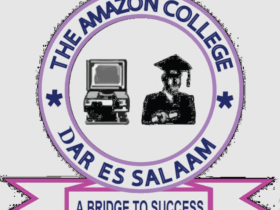The Royal College of Journalism (RCJ) in Dar es Salaam is a private institution that offers a range of journalism and communication training programs. The college is registered with the Tanzania Commission for Universities (TCU) and is one of the units of Tanzania Volunteers for Development Trust (TAVODET). The college is under the administration of the TAVODET Board of Trustees, which entrusts the powers to the Executive Officer under their supervision.
RCJ offers programs ranging from Basic Technician Certificate in Journalism at Level 4, Technician Certificate in Journalism at Level 5, and Ordinary Diploma in Journalism at Level 6. The college is committed to providing quality education to students and preparing them for successful careers in the field of journalism. RCJ’s curriculum is designed to equip students with the necessary skills and knowledge to become competent journalists, capable of producing high-quality content for various media platforms.
If you are interested in pursuing a career in journalism, RCJ is an excellent choice. The college has experienced faculty members who are experts in their field and provide students with hands-on training and guidance. The college’s facilities are modern and well-equipped, providing students with a conducive learning environment. With its commitment to quality education and focus on practical training, RCJ is a top choice for students looking to build a successful career in journalism.
Programs
Basic Certificate in Journalism: A Three-Month Transformative Program
- B/J 101 – Broadcasting Journalism (Core) – 3 Units
- P/J 101 – Photo-Journalism (Core) – 3 Units
- P/L 101 – Press Law (Core) – 3 Units
- M/C 101 – Mass Communication (Core) – 3 Units
- N/R 101 – News Reporting (Core) – 3 Units
- L/G 101 – Communication Skills (Core) – 3 Units
- I/C 101 – Basic Computer Application (Elective) – 3 Units
Advanced Certificate in Journalism: A Year-Long Immersive Program
Modules/Units:
- Advanced News Writing and Reporting:
- Hone your ability to write impactful and engaging news stories.
- Learn advanced reporting techniques, including data journalism and investigative methods.
- Adapt your writing style for various media platforms, including print, digital, and broadcast.
- Multimedia Journalism:
- Master the art of multimedia storytelling, incorporating video, audio, and interactive graphics.
- Develop skills in video production, editing, and podcast creation.
- Explore innovative ways to present stories on digital platforms.
- Investigative and Data Journalism:
- Dive deep into the world of investigative journalism.
- Learn how to uncover hidden information through data analysis and research.
- Understand the legal and ethical implications of investigative reporting.
- Media Law, Ethics, and Policy:
- Gain a thorough understanding of the legal environment surrounding journalism.
- Explore complex ethical issues and develop a framework for making ethical decisions.
- Study the impact of media policies on journalism practice and freedom of the press.
- Specialized Reporting:
- Focus on niche areas such as political reporting, business journalism, and science communication.
- Develop expertise in covering specialized beats and complex topics.
- Learn how to make specialized content accessible and engaging to a broader audience.
- Digital and Social Media Strategies:
- Stay ahead of the curve with cutting-edge digital journalism techniques.
- Utilize social media for effective news dissemination and audience engagement.
- Experiment with new digital tools and platforms to enhance your storytelling.
- Capstone Project:
- Apply your learning in a comprehensive, real-world project.
- Produce a high-quality piece of journalism that showcases your skills and creativity.
- Receive mentorship and feedback from industry professionals to refine your work.
Program Highlights:
- Expert Instruction: Learn from leading journalists and media experts with extensive industry experience.
- Hands-On Experience: Engage in practical assignments, fieldwork, and collaborative projects.
- Professional Networking: Build connections with peers, mentors, and media organizations.
- Career Advancement: Receive personalized career guidance and support for job placements and internships.
Diploma in Journalism and Broadcasting: A Comprehensive Two-Year Program at Royal College of Journalism-Dar es Salaam
Program Overview: Embark on a transformative journey with our two-year Diploma in Journalism and Broadcasting at the esteemed Royal College of Journalism in Dar es Salaam. This program is designed for individuals passionate about storytelling, media production, and broadcasting, providing them with the skills and knowledge needed to excel in the dynamic world of journalism and broadcasting.
Modules/Units:
- Introduction to Journalism:
- Explore the fundamentals of journalism, including its history, principles, and ethics.
- Understand the role of journalism in society and its impact on public opinion.
- News Writing and Reporting:
- Develop strong news writing and reporting skills for various media platforms.
- Learn techniques for effective interviewing, fact-checking, and source verification.
- Broadcast Journalism:
- Gain hands-on experience in radio and television journalism.
- Learn the essentials of broadcast writing, production, and presentation.
- Develop skills in voice training, on-camera presence, and live reporting.
- Digital Journalism and Social Media:
- Navigate the digital landscape and leverage social media for news dissemination.
- Explore multimedia storytelling, including video, audio, and interactive graphics.
- Learn about digital content creation, distribution, and audience engagement.
- Investigative Journalism:
- Dive into investigative reporting techniques and tools.
- Learn how to conduct in-depth research, uncover hidden stories, and hold power to account.
- Understand the ethical and legal considerations in investigative journalism.
- Media Law and Ethics:
- Study the legal framework governing journalism and broadcasting.
- Explore ethical issues and develop a strong moral compass for making journalistic decisions.
- Analyze case studies to understand the challenges faced by journalists and broadcasters.
- Broadcast Production:
- Gain practical skills in radio and television production, including scriptwriting, editing, and directing.
- Learn about the technical aspects of broadcasting, such as sound engineering, camera operations, and studio management.
- Produce and broadcast your own radio and TV segments.
- Public Relations and Media Management:
- Understand the role of public relations in media and communication.
- Learn strategies for managing media relations, crisis communication, and branding.
- Develop skills in media planning, campaign management, and audience analysis.
- Capstone Project:
- Apply your learning in a comprehensive, real-world project.
- Produce a high-quality piece of journalism or a broadcast segment that showcases your skills and creativity.
- Receive mentorship and feedback from industry professionals to refine your work.
Application Process
Admission Requirements
To be eligible for admission to the Royal College of Journalism, RCJ Dar es Salaam, applicants must meet the following minimum requirements:
- Possess a certificate of secondary education (CSEE) with a minimum of four passes in relevant subjects.
- For diploma programs, applicants must possess a certificate of secondary education (CSEE) with a minimum of three passes in relevant subjects.
- For degree programs, applicants must possess a diploma in relevant fields with a minimum GPA of 3.0.
How to Apply
Applicants can apply to the Royal College of Journalism, RCJ Dar es Salaam, by following the below steps:
- Visit the RCJ Dar es Salaam website at www.royalcollege.ac.tz.
- Click on the “Apply Now” button on the homepage.
- Fill in the application form with accurate and complete information.
- Upload all the required documents, including academic certificates and transcripts.
- Pay the application fee through the provided payment options.
- Submit the application form and wait for a response from the college.
Application Deadlines
The Royal College of Journalism, RCJ Dar es Salaam, has specific application deadlines for each intake. Applicants are advised to check the college’s website for the latest application deadlines. It is recommended that applicants submit their applications well in advance of the deadline to avoid any delays or complications in the application process.
Contact Information
The Royal College of Journalism (RCJ) is located in Dar es Salaam, Tanzania. For general inquiries, prospective students can contact the college’s administration office via phone or email. The college’s website also provides additional contact information for specific departments.
Phone Number
The RCJ’s administration office can be reached via phone at +255 (22) 282 0041 or +255 (22) 282 0047. Prospective students can also contact the college’s admission office at 0754/0713 233304.
Email Address
For general inquiries, prospective students can contact the RCJ’s administration office via email at info@royalcollege.ac.tz. Prospective students can also contact the college’s admission office via email at admission@royalcollege.ac.tz.
Website
The RCJ’s official website, www.royalcollege.ac.tz, provides additional contact information for specific departments. Prospective students can also find information about the college’s programs, admission requirements, and application process on the website.
Overall, the RCJ’s administration office is easily accessible via phone and email. The college’s website also provides comprehensive information for prospective students.
Also Read;
- SUA Diploma and Certificate Courses and Fees 2024/2025
- SAUT SIMS Portal Login 2024/2025 Access Easily
- Catholic University College of Mbeya SAUT Fee Structure: Everything You Need to Know
- Univen Courses and Requirements 2024/2025-University of Venda
- NMU Courses and Requirements 2024/2025-Nelson Mandela University
- WSU Courses List & Requirements 2024/2025-Walter Sisulu University
- Courses Offered at Tumaini University Dar es Salaam College (TUDARCo) 2024/2025





Leave a Reply